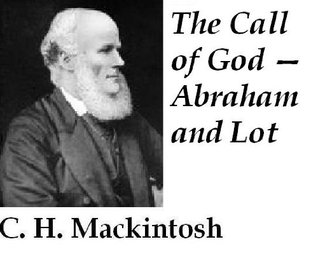The Call of God - Abraham and Lot
by C.H. Mackintosh
From The Mackintosh Treasury
Miscellaneous Writings
Volume III: Lessons from the Old Testament
Table of Contents
Genesis 12
Genesis 13
Genesis 14
Genesis 15
Genesis 16 - 17
Genesis 18 - 19
Genesis 20 — Genesis 21
Genesis 22
"In a day of such widely extended profession as the present, it is specially important that Christians should be deeply impressed with the necessity of realizing personally the call of God, without which there can be no permanence or steadiness in the Christian course.
"It is a comparatively easy thing to make a profession at a time when profession prevails; but it is never easy to walk by faith — it is never easy to give up present things, in the hope of "good things to come." Nothing but that mighty principle which the Apostle denominates "the substance of things hoped for, the evidence of things not seen" (Heb. 11: 1), can ever enable a man to persevere in a course which in a world where all is wrong — all out of order, must be thorny and difficult. We must feel "persuaded" of something yet to come — something worth waiting for — something that will reward all the toil of a pilgrim's protracted course, ere we rise up out of the circumstances of nature and the world, to "run with patience the race that is set before us" (Heb. 12: 1).
"All this is fully exemplified in Abraham, and the exemplification receives additional force from the contrast exhibited in the character of Lot and others who are introduced in the course of the narrative." C.H.M.
Miscellaneous Writings
Volume III: Lessons from the Old Testament
Table of Contents
Genesis 12
Genesis 13
Genesis 14
Genesis 15
Genesis 16 - 17
Genesis 18 - 19
Genesis 20 — Genesis 21
Genesis 22
"In a day of such widely extended profession as the present, it is specially important that Christians should be deeply impressed with the necessity of realizing personally the call of God, without which there can be no permanence or steadiness in the Christian course.
"It is a comparatively easy thing to make a profession at a time when profession prevails; but it is never easy to walk by faith — it is never easy to give up present things, in the hope of "good things to come." Nothing but that mighty principle which the Apostle denominates "the substance of things hoped for, the evidence of things not seen" (Heb. 11: 1), can ever enable a man to persevere in a course which in a world where all is wrong — all out of order, must be thorny and difficult. We must feel "persuaded" of something yet to come — something worth waiting for — something that will reward all the toil of a pilgrim's protracted course, ere we rise up out of the circumstances of nature and the world, to "run with patience the race that is set before us" (Heb. 12: 1).
"All this is fully exemplified in Abraham, and the exemplification receives additional force from the contrast exhibited in the character of Lot and others who are introduced in the course of the narrative." C.H.M.
BUY NOW
Kindle Edition, 31 pages
Published August 6th 2011
© 2025 Bibleportal.com 版权所有.

Charles Henry Mackintosh (1820-1896) was an Irish preacher, Bible expositor, and author. Active in the Irish Revival of 1859-1860. His first tract, in 1843, was "The Peace of God," and his last, shortly before his death in 1896, was "The God of Peace." Generally known as C.H.M., was one of the gifted writers of the Plymouth Brethren, so-called.
He was schoolmaster at Westport, County Mayo, Ireland, for a few years. But for the greater part of his life he devoted himself to evangelism and pastoral ministry as well as to religious journalism, as editor of the monthly periodical Things New and Old; and to religious literature. He was the author of the Notes by C. H. M, on all the books of the Pentateuch, which enjoyed great popularity, being sold in enormous quantity, especially in the United States.
... Show more